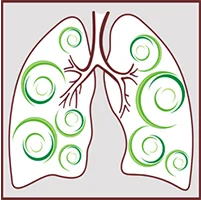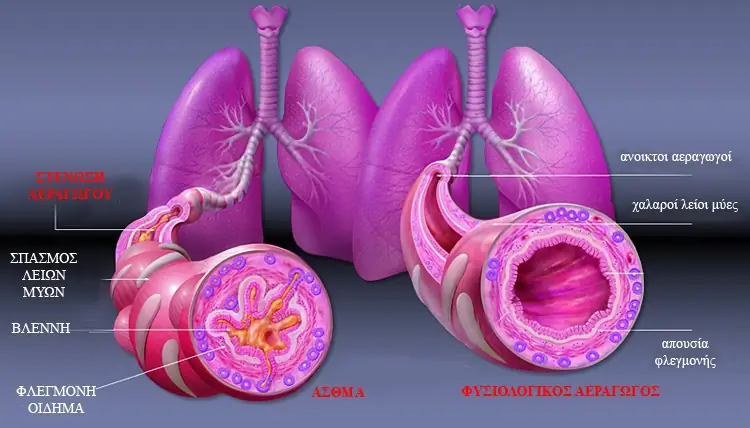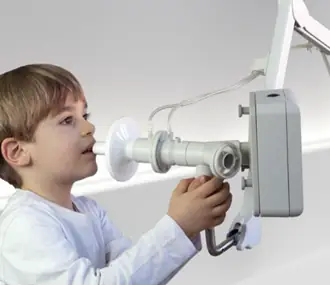Asthma is a chronic inflammatory condition of the airways and can result from various factors, including genetic factors, environmental exposures, and allergic reactions.
The History of Asthma
Historical Data
Asthma is a disease known since antiquity; the first recorded symptoms resembling those of asthma are found in an Egyptian papyrus dating back to 1550 BCE. The term “asthma” is mentioned by Homer in the Iliad as shortness of breath or panting, while Hippocrates (460-377 BCE) was the one who introduced the term “asthma” in medicine, in the Hippocratic Corpus.
The first description of asthma as the disease we know today is attributed to Aretaeus of Cappadocia, a Greek physician who lived in the 2nd century BCE.
How common is asthma?
Asthma in Greece
Asthma is a disease that affects all populations. It is estimated that 300 million people have asthma worldwide, occurring in 1-18% of the population, depending on the country.
Studies have shown that in Greece, 8.6% of the population has asthma (9.2% of adults and 5.9% of children/adolescents). In the geographical distribution map of the disease, asthma appears to be more common in Attica, the Peloponnese, and Crete, with lower rates observed in Northern Greece and the island regions of the country.
These differences are likely due to the climatic conditions of the various regions as well as the different exposure to environmental irritants and allergens.
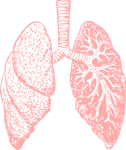
Does asthma discriminate?
Famous Personalities & Asthma
Of course not!
People with asthma include politicians, artists, athletes, and even professionals, without it being an obstacle to their success, such as the famous footballer David Beckham and the 9-time Olympic gold medalist swimmer Mark Spitz.
Asthma can occur at any age. In childhood, it is usually due to allergies. In adults, it is less related to allergies and can be more severe, especially when not treated properly.
For what reason does asthma occur in some people?
Heredity, smoking, etc.
The cause of asthma onset is unknown. This is likely due to the fact that it develops due to a combination of genetic predisposition and environmental factors.
It is often seen in children of parents with asthma, among siblings, and especially among twins, indicating heredity.
Smoking, both during pregnancy and after birth, negatively affects lung development and can lead to asthma, while on the contrary, maternal breastfeeding, living in rural areas, consuming unprocessed milk, etc, seem to protect against the likelihood of developing asthma.
What happens when someone has asthma?
Airway Inflammation
In asthma, the bronchi, the airways that carry air to the lungs, are affected. Specifically, the airways become inflamed, meaning they become red, hypersensitive, swollen, and therefore their lumen narrows.
Additionally, small muscles surrounding the airways (like rings) contract, leading to further constriction (bronchospasm), while increased mucus production (phlegm) blocks the bronchi. As a result of the above, there is difficulty both in the entry and exit of air from the lungs.
Asthma presents with shortness of breath (difficulty breathing), tightness or pressure in the chest, wheezing (whistling sound during breathing, often described as 'wheezing'), and often accompanied by coughing
What are the symptoms of asthma? When do we suspect someone has asthma?
Characteristic of Asthma
Asthma manifests with dyspnea (difficulty breathing), tightness or pressure in the chest, wheezing, and often, coughing.
Characteristic of asthma is that these symptoms vary over time. They may be more pronounced late at night or early in the morning, fluctuate from day to day, with the seasons, and after exposure to triggering factors (such as dust, pollen, cigarette smoke, strong odors, physical exertion, intense laughter, stress, workplace irritants, foods, humidity, and weather changes, etc.).
Symptoms may worsen with respiratory infections, while they typically improve automatically or after treatment.
How Asthma Can be Diagnosed?
Diagnosing asthma is not always straightforward as symptoms vary in severity, fluctuate over time, and are sometimes mild.
For this reason, evaluation by a pulmonologist is necessary, who will make the diagnosis considering a combination of factors such as the patient’s history, clinical examination, and the results of specialized diagnostic methods including spirometry, exhaled nitric oxide measurement, and oscillometry.
Spirometry
Spirometry is an easy examination for the patient where we measure the speed and quantity of air passing through the bronchi during forced breathing.
It is absolutely necessary and irreplaceable for all patients (children and adults) experiencing respiratory symptoms.
The measurements we obtain are essential to diagnose the degree of bronchial obstruction that occurs in asthma, monitor improvement after treatment, and promptly recognize exacerbations that may occur.
Modern spirometers come with suitable software that makes spirometry enjoyable, even for young children, which is particularly useful for diagnosing and treating asthma in our little friends..
Είναι μια απολύτως αναγκαία και αναντικατάστατη εξέταση που πρέπει να κάνουν όλοι οι ασθενείς (παιδιά και ενήλικες) που έχουν συμπτώματα από το αναπνευστικό.
Οι μετρήσεις που παίρνουμε είναι απολύτως απαραίτητες για να διαγνώσουμε τον βαθμό της απόφραξης των βρόγχων μας που συμβαίνει στο άσθμα, να παρακολουθήσουμε την βελτίωση μετά την λήψη της θεραπείας αλλά και να αναγνωρίσουμε έγκαιρα τις παροξύνσεις που μπορεί να συμβούν.
Τα σύγχρονα σπιρόμετρα διαθέτουν κατάλληλο λογισμικό που καθιστούν την σπιρομέτρηση ευχάριστη σαν παιχνίδι ακόμη και σε μικρά παιδιά, γεγονός ιδιαίτερα χρήσιμο για τη διάγνωση και τη θεραπεία του άσθματος στους μικρούς μας φίλους.
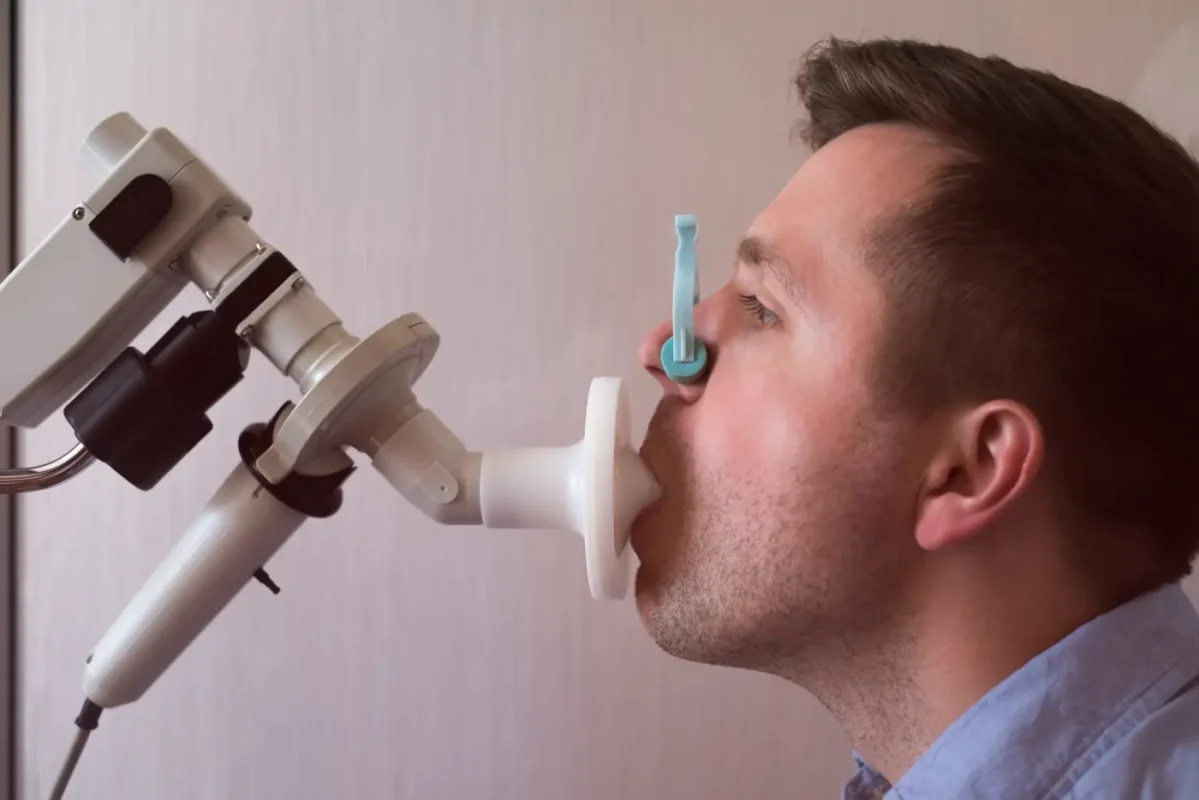
Exhaled Nitric Oxide (NO)
Exhaled nitric oxide (NO) is also an easy examination for both children and adults, performed with a simple but slow and steady exhalation.
Nitric oxide is a gas produced in our lungs by cells involved in allergic reactions, mainly eosinophils.
Measurement is done with state-of-the-art devices developed in recent years. By measuring NO, we have a direct estimate of the degree of allergic inflammation within the bronchi.
It is an excellent measurement that aids in the diagnosis of asthma, but primarily helps in selecting the correct treatment and adjusting the dosage over time.

Impulse Oscillometry
Impulse oscillometry is also a useful and state-of-the-art examination with which we measure the lung function in depth.
It is particularly useful in young children who cannot cooperate with spirometry and as an additional examination to spirometry in adults.
During impulse oscillometry, we measure the acoustic signals generated during quiet breathing at various frequencies, obtaining information that no other examination can provide.
By measuring the acoustic signals, the oscillometry calculates significant parameters, primarily the resistance of the airways, which is increased in asthma.
Many times, it is a more sensitive method compared to spirometry. This examination is very easy for the patient and children because it requires no effort (quiet breathing).

Is Asthma Curable?
Until today, there hasn't been a treatment that guarantees asthma will never appear in a specific patient. However, there are many therapeutic options that can achieve complete elimination of symptoms and alleviate any restriction caused by asthma in the patient, allowing them to lead a normal life.
Abundant Therapeutic Options
The goal of treatment is to manage and control symptoms to achieve the best possible quality of life for the patient. Prevention of complications and maintenance of lung function are also important objectives.
Abundant therapeutic options that achieve complete disappearance of symptoms and elimination of any limitations that asthma may impose on the patient can help them lead a completely normal life.
When this goal is achieved, the likelihood of asthma not appearing for many years (or even never again) is very high for the overwhelming majority of patients.
Conversely, without proper treatment, permanent changes in the bronchi may occur over time, obstructing their full opening, resulting in symptoms becoming permanent and asthma appearing more frequently or continuously.
Patient education regarding asthma management and identification of factors exacerbating symptoms plays a significant role.
What is the treatment for asthma?
Modern Therapeutic Approaches
Asthma is managed by the patient avoiding triggers that worsen their asthma and by receiving treatment from their pulmonologist.
The asthmatic individual must avoid coming into contact with anything that exacerbates their condition, such as dust, cigarette smoke (thus, avoiding smoking and exposure to secondhand smoke), and any known allergens.
To identify potential allergies, allergic skin tests (e.g., skin prick tests or blood tests) should be conducted on every asthmatic individual. Additionally, those suffering from asthma should be vaccinated with the pneumococcal vaccine (according to their pulmonologist’s guidance) and receive the influenza vaccine every autumn, as respiratory infections are a common trigger for asthma exacerbation.
Medications and Management of Asthma
The management of asthma often involves the use of medications designed to relieve symptoms and prevent attacks.
The medications used in asthma are extremely easy to use, safe, and effective. They are usually administered in the form of inhalers or tablets, while in recent years there are also injectable therapies for rarer and more severe cases.
Asthma medications are divided into 2 categories:
Regulatory Medications
Regulatory medications, those that address the cause of asthma, namely inflammation in the bronchi. These are medications that should be used daily and long-term and, if possible, gradually discontinued after complete control of asthma and only upon recommendation of a pulmonologist.
Such medications include inhaled corticosteroids, leukotriene modifiers (e.g., montelukast tablets), and for severe asthma “biological agents” such as injectable anti-IgE (Xolair) and anti-IL5 (Nucala), anti-L5R (Fasenra).
Asthmatics and parents of children with asthma should be aware that inhaled corticosteroids (cortisone) are the cornerstone of asthma treatment (allergic or non-allergic) and are very safe even in small children or pregnant women. This is simply because they have a purely local action within the bronchi.
When taken at the correct dosage, they rarely have side effects, which, moreover, are insignificant compared to the normal – symptom-free and crisis-free – life they provide.
Relief Medications
Relief medications, those that induce rapid and often dramatic relief of symptoms by relieving bronchospasm.Such medications include short-acting bronchodilator inhalers like salbutamol (e.g., Aerolin) and long-acting bronchodilator formoterol, which when used in combination with inhaled corticosteroids simultaneously provide relief and control of asthma.
Frequent use of Aerolin has no effect on asthma control, and when this occurs, the patient’s pulmonologist should be informed.
Will I be taking medication for my whole life?
The need for asthma medication depends on several factors, such as the patient's symptoms, possible exacerbations, lung function (as measured by specialized tests by the pulmonologist), and individual needs.
Asthma Is a Variable Disease
The asthma is not a homogeneous and stable disease, but its severity varies depending on the patient from very mild to very severe.
Moreover, asthma is a variable disease and each patient may have periods of complete control of their asthma as well as periods of exacerbations. For this reason, management and treatment cannot be the same for all patients, nor even the same for a specific patient over time.
Treatment must be adjusted and adapted to the needs of the individual patient, the specific period of his life, and the course of his disease, as is the case with most diseases (hypertension, diabetes, etc.).
More frequently, after asthma is controlled, we gradually stop the treatment and the patient remains asymptomatic for long periods or even for the rest of his life!
Can My Asthma Suddenly Get Worse?
Yes, it can, and this is called exacerbation.
Exacerbations (attacks) of asthma occur, as mentioned, after infections or triggering factors, presenting as persistent cough, wheezing, and tightness in the chest that do not go away or lead to frequent use of reliever medication. When a person with asthma experiences a change in their asthma symptoms, they should be evaluated by their treating pulmonologist.
This need becomes urgent when the shortness of breath is so severe that there is difficulty speaking, waking up from sleep, difficulty walking, bluish coloration of the lips or fingers, rapid heartbeat, and no improvement after using the reliever medication.
Exacerbation is a condition where the symptoms of asthma worsen suddenly and dramatically. It can be triggered by various factors, such as certain illnesses, exposure to allergens, exposure to irritants like cigarette smoke, or even exercise.
They told me I have asthma, and it scares me.
The diagnosis of asthma distresses and frightens many people, especially when they are not well informed, as they believe they will suffer for the rest of their lives. In reality, asthmatics can lead perfectly normal lives with appropriate treatment.
Managing the Diagnosis of Asthma
The fact that an asthma patient has increased sensitivity in the bronchi and may experience shortness of breath does not mean they cannot lead a completely normal life. We can bring an example here.
Small children have increased sensitivity to the sun. We protect them with hats and sunscreen, and they don’t get sunburned. Similarly, we protect asthmatics with appropriate medications so that asthma is fully controlled.
The patient must understand that they suffer from a chronic disease, learn to live with it, and realize that the vast majority of patients lead normal lives by taking “simple” and effective medications.
Finally, by following the instructions of their pulmonologist, the likelihood of their asthma remaining “inactive” for many years and not requiring any treatment at all is significantly increased.

Asthma and Pregnancy
Consequences and Caution
Asthma is one of the most common conditions associated with pregnancy. Studies show that about 0.5% to 4% of pregnancies are complicated by asthma. During pregnancy, asthma worsens in about one-third of women, improves in one-third, and remains unchanged in one-third.
When a pregnant woman has asthma and does not receive adequate treatment, adverse events for both her and her baby may occur, such as fetal death, preterm delivery, hypertensive disorders, or gestational diabetes, pre- and post-delivery bleeding, etc. For these reasons, pregnant women with asthma require careful monitoring and appropriate treatment.
A pregnant woman with asthma should be concurrently monitored by her pulmonologist, in collaboration with the obstetrician providing her prenatal care, especially in cases of moderate-to-severe asthma or pregnancies with complications. If you are pregnant and have asthma, you should regularly consult your doctor from the beginning and throughout the pregnancy.
The goals of managing asthma during pregnancy include providing the minimal effective treatment so that the pregnant woman has no symptoms, can maintain normal levels of activity, and has good spirometry to safely bring a healthy child into the world.
The treatment of asthma during pregnancy does not differ significantly from that outside of pregnancy.
Most medications used to treat asthma, especially inhalers, are safe during pregnancy and should not be discontinued by the pregnant woman because proper asthma control ensures the health of the fetus and the mother.
It is also very important during pregnancy to make every possible effort to avoid environmental triggers and irritants.


Asthma and Children
Asthma in Children: A Guide for Parents
In children, asthma manifests with symptoms similar to adults (coughing, wheezing, shortness of breath, chest tightness), which become more pronounced during play, exercise, or intense laughter.
Many times, it requires attention because a child with undiagnosed or poorly managed asthma may reduce physical activity in a way that can escape the attention of their parents.
In children under 5 years old, where viral infections are common, diagnosing asthma is more challenging.
In these children, asthma may be present when symptoms persist for more than 10 days after a viral infection, when the child has frequent episodes every year, when there is worsening during the night, during laughter, play, and when there is a family history of atopy (allergy) or asthma among parents or siblings.
Management and Care
Diagnosis of asthma in children is based on history, clinical examination, spirometry (children can usually perform spirometry correctly after 4-5 years), and exhaled nitric oxide (FeNO).
Newer tests such as oscillometry or measurement of resistances (tests performed with simple breaths) provide significant information, especially when the child cannot cooperate for spirometry. When symptoms are not clear, sometimes we need to administer a trial therapy for 2-3 months and assess if there is improvement in symptoms during its administration.
Treatment of asthma in children is done with similar drugs to adults but with different doses and using special inhalers depending on the age.
Often, to calculate the lowest possible drug dose, we also use the results from newer tests (FeNO and oscillometry). Proper administration is important so that the child does not risk serious exacerbations and can live a normal life without restrictions, which can have adverse effects on physical and social development.
For early diagnosis and proper management of asthma, there must be continuous collaboration with the child’s pediatrician.
